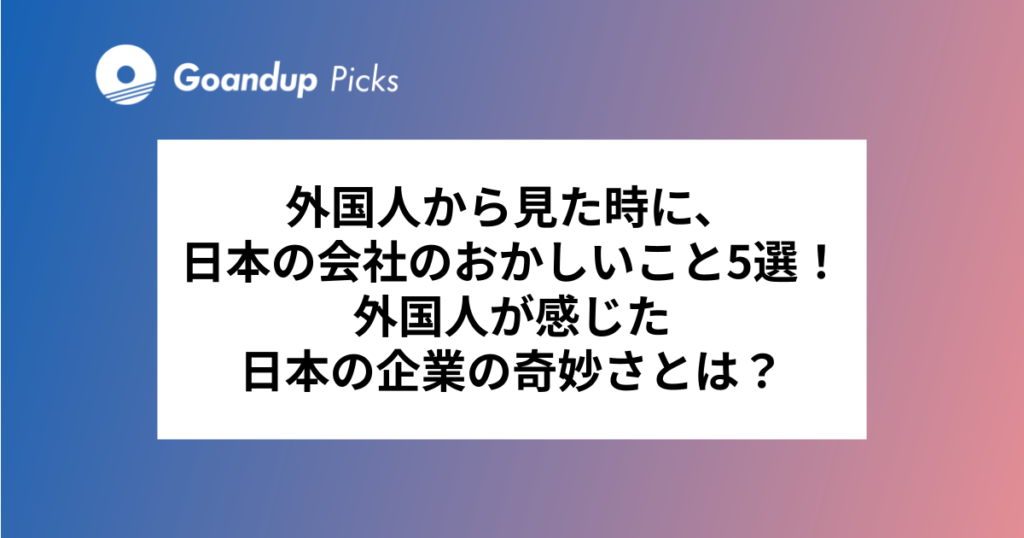Five things that are strange about Japanese companies from a foreigner's point of view! What are the strangeness of Japanese companies as perceived by foreigners?

What is strange about Japanese companies from a foreigner's point of view? Let us explain in detail.
Five things that are strange about Japanese companies from a foreigner's point of view!

overwork
Japanese companies often force workers to work overtime, which often leads to health problems and overwork deaths. From a foreigner's perspective, a work environment like this may come as a surprise.
(Japanese) system of lifetime employment
Another characteristic of Japanese companies that is not often seen overseas is the lifetime employment system. This system of working for one company for the rest of one's life is difficult to understand because it discourages career change and new challenges.
promotion system
The promotion system in Japanese companies is based on seniority and not on merit. As a result, length of service is often more important than ability and performance, which may seem questionable from a foreigner's perspective.
Power and Moral Harassment
Power harassment and moral harassment in Japanese companies are serious problems. Excessive pressure from superiors to subordinates, unreasonable demands, and character assassination are phenomena that are difficult for foreigners to understand.
company retreat
Company trips are common in Japanese companies, but this is another culture that is difficult for foreigners to understand. Many foreigners feel uncomfortable spending private time with people from the same workplace.
Cross-Cultural: Japanese Business Etiquette and 5 Japanese Corporate Weirdnesses as Perceived by a Foreigner!

The accuracy and strictness of Japanese business etiquette is recognized worldwide. However, from a foreigner's point of view, the peculiarities may seem strange. Below are five of the strangest things foreigners have experienced and felt at Japanese companies.
culture of working overtime
The first is the "overtime culture. In many Japanese companies, it is considered normal to work overtime rather than going home on time. This is a concept that is difficult for some foreigners to understand and seems to ignore productivity and worker happiness.
hierarchical relationship
Second is "hierarchical relationship. In Japanese companies, there is a strong hierarchical relationship based on age and experience. This creates a situation where it is difficult to express one's own opinions, and it can also inhibit new ideas and change, which is seen as inefficient from a foreigner's point of view.
year-end party
Next is the "year-end party. This is a gathering of employees after working hours, and to a foreigner it may appear to be an act of self-sacrifice. However, it is a part of communication in Japanese companies and an important opportunity to strengthen bonds.
Silent agreement
Fourth is "silent agreement". Silence is often the means of agreement in meetings, but this can be confusing to foreigners. It also limits opportunities for serious discussion and rebuttal, and multiple perspectives can be lost.
honorific
Finally, there is "keigo. This is a unique Japanese way of expressing oneself and is indispensable in business situations. However, it is often difficult for foreigners to understand because there are various forms that express respect and humility toward the other party, respectively.
These are five characteristics of Japanese companies that seem strange to foreigners, but it is important to understand that they all reflect Japanese culture and values.
Strange as it may seem, these are part and parcel of the Japanese work environment, and they are the backbone of the success of Japanese companies. For us foreigners, understanding and respecting these differences can go a long way in ensuring smooth business interactions.
Is this normal? 5 Strange Phenomena of Japanese Companies as Perceived by Foreigners

Japan attracts worldwide attention for its unique culture, and the business world is no exception.
Foreigners, in particular, are sometimes surprised by the peculiar aspects and unique culture of Japanese companies. Here, we will explain five peculiarities of Japanese companies that may make you feel "Is this normal?" Here we will explain five peculiarities of Japanese companies that may make you feel "Is this normal?
(Japanese) system of lifetime employment
The first is the "lifetime employment system. In this system, once you join a company, you basically continue to work until retirement.
In other countries, this type of work is not common, with the exception of some government employees and teachers. In Japan, however, many large companies have adopted this system. While it offers a stable life, it may also make it difficult to change jobs.
karoshi
Next is "overwork death. It refers to the loss of life due to health problems caused by long working hours, and unfortunately, it is a special expression only used in Japan. Improvement of the working environment is necessary, but this harsh phenomenon must be incomprehensible to foreigners.
seniority by length of service
In addition, the "seniority system" is also unique to Japanese companies. This is a system in which promotion and salary are determined by the number of years in the company and age, and may be difficult for foreigners, who value ability-based systems, to understand.
hierarchical relationship
In addition, "hierarchical relationships" are thoroughly enforced in Japanese companies. This extends to details such as the use of honorifics in the workplace and the order of seating at drinking parties. In many foreign cultures that value equality, such formal hierarchical relationships may seem alien.
Unnecessary meetings
Finally, let me talk about "unnecessary meetings. In Japanese companies, meetings in which everyone participates sometimes go on and on, and time passes without reaching a conclusion. This may seem very strange to efficiency-conscious foreigners.
These are the five phenomena that foreigners find strange in Japanese companies. All of these phenomena are the result of Japan's unique culture and climate, and whether they are good or bad depends on the individual's way of thinking. However, understanding these phenomena is the first step to building a good relationship with Japanese companies.
East and West: Five Unique Characteristics of Japanese Companies from a Foreigner's Perspective

From a foreigner's point of view, some aspects of Japanese corporate culture may seem strange. However, this is simply a cultural difference, and understanding it is a good opportunity to learn more about Japan. In this issue, we have selected five unique aspects of Japanese companies as seen from a foreigner's perspective.
(Japanese) system of lifetime employment
The first is the "lifetime employment system. This means that once an employee joins a company, he/she continues to work there until retirement. This system seems very peculiar because in Europe and the U.S., many people choose to change jobs for self-realization and career paths.
culture of working overtime
Next, we should focus on the "overtime culture. In many Japanese companies, long working hours are considered the norm, and leaving work on time is sometimes considered a sin. However, from the perspective of productivity and worker health, there is room for improvement in this culture.
hierarchical relationship
Another important point is the hierarchical relationship. In Japanese companies, the seniority system is deeply rooted, and hierarchical relationships are determined by age and years of service. This may seem alien to Western culture, which emphasizes freedom and equality.
No Meeting Day
And then there is "No Meeting Day. Some Japanese companies regularly set aside days when meetings are prohibited in order to improve worker productivity. This may seem a novel approach to foreigners.
work regulations
Finally, there are "work rules. Japanese companies have employment regulations, which set forth in detail the behavior and attitude of their employees. This strictness may come as a surprise to foreigners who seek a free work environment.
These are five things that foreigners find strange in Japanese companies. These are all due to cultural differences, and as Japanese corporate culture is better understood, the advantages and disadvantages of each will become clearer.
5 Surprising Cultures of Japanese Companies Found by Foreigners

The working environment and culture of Japanese companies are world renowned. And sometimes, they have features that surprise foreigners. Here are five unexpected cultural features of Japanese companies that foreigners have discovered.
working hours
The first is "working hours. Long working hours are common in Japanese companies, which is surprising to foreigners. Especially in Western countries, working hours are often strictly regulated, and balancing health and family life is considered important.
culture of working overtime
Next is the "overtime culture. This is related to the aforementioned working hours, but the sight of workers continuing to work past the end of the workday may not be a common sight in other countries.
Another characteristic phenomenon is "service overtime," or unpaid overtime work, which is often unpopular and criticized by foreigners.
hierarchical relationship
The third point worth mentioning is the "hierarchical relationship. In Japanese companies, the seniority system is deeply rooted and instructions are always given from the top down. Overseas, on the other hand, flat organizations tend to be preferred, and a culture of freely expressing opinions is widely prevalent.
drinking culture
The fourth is the "drinking culture. Going out for drinks with one's boss or colleagues after work is considered a form of communication in Japanese companies. However, many foreigners feel that it infringes on their private time.
job hunting
Finally, there is "job hunting. In Japan, it is common for students to begin job hunting before graduation and to graduate only after receiving a job offer. On the other hand, in other countries, many students begin job hunting after graduation, which is also a surprising difference.
These are five surprising aspects of Japanese corporate culture as seen from a foreigner's perspective. It is important to understand that these are not good or bad, but rather differences in thinking that stem from differences in culture and values.
summary
We explained five things that are strange about Japanese companies from a foreigner's point of view, as well as the strangeness of Japanese companies as perceived by foreigners.
Summarize the key points.
- Long working hours: Excessive long working hours are the norm in Japanese companies and may be seen as abnormal by foreigners.
- Orderly culture: The culture of strict hierarchical relationships and absolute orders from superiors prevents the free exchange of opinions.
- Emphasis on relationships: Communication skills and relationships tend to be more important than competence, and group cooperation is often required rather than individual ability.
- Stability-oriented: From a foreigner's point of view, they lack a sense of adventure and a spirit of challenge, and there is little atmosphere for trying new things.
- Seniority: From the perspective of a foreigner who values meritocracy, it is difficult to understand how promotions and treatment are largely determined by age and years of service.
Is everyone's place of employment safe?
If any of these apply to you and you feel that this is not the right company for you, we recommend that you change jobs.
▼Click here to see our recommended job search sites.
Get a job offer at the company of your choice! Uzcari Graduates
Employment and career change service specializing in people in their 20s【New Graduates Agent neo】.






